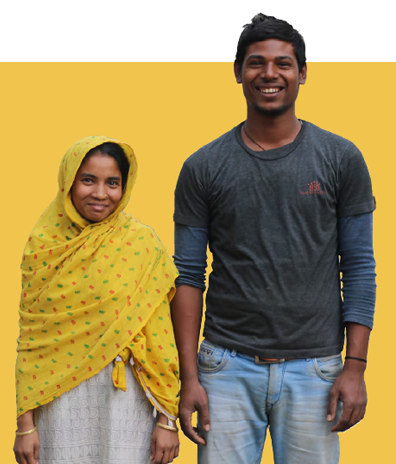How a Subdermal Implant Changed Hena’s Life
Contributors: Bipin Kumar, Saurav Tiwari, Deepti Mathur, Parul Saxena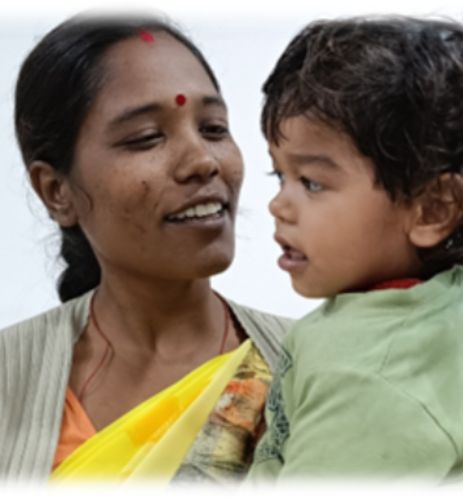
Hena Kumari, a 28-year-old mother of four from Patna, Bihar, had long struggled with unplanned pregnancies. Her husband’s irregular work and lack of awareness made their situation even more challenging. A health crisis eventually pushed her to seek guidance that changed her life.
Choosing the implant was the best decision for me. For the first time, my husband and I feel mentally free from the fear of unplanned pregnancy. Now, without that constant worry, I can give my four children the resources and attention they deserve.”
Hena Kumari
Family planning beneficiary, Patna, Bihar
Many women face limited access to modern contraceptive options, leading to unplanned pregnancies and unsafe abortion practices. Strengthening counselling, improving service availability, and expanding contraceptive choices are essential to ensure women can make informed reproductive decisions.
Hena had been married for twelve years, and they had four children—a 12-year-old son and three young daughters. Her husband, a migrant worker, was often away and earned irregularly. Hena recalls, “Two of my pregnancies were unplanned, and raising four children felt overwhelming. We had no idea where to seek guidance.”
Their fear of another pregnancy grew, the situation turned critical when Hena, four months pregnant, took abortion pills without medical supervision. Severe complications followed, landing her in PMCH for an emergency abortion procedure. “I was terrified, I kept thinking who will take care of my children if something happens to me?”-says Hena.
During her recovery, trained PMCH providers and PSI India team counselled her on family planning options. Hena learned about the subdermal implant, a long-acting reversible method providing up to three years of protection. With trust and clarity, she chose the implant. She shares- “The implant gave me three years of protection without any hassle.” The experience also changed her husband’s perspective, he took up local work to support the family better.
Now healthier and free from fear, Hena plans to undergo tubal ligation once the implant’s duration ends, ensuring long-term stability for her children.
Through NCP, PSI India continues strengthening provider capacity and expanding access to modern contraceptives to empower women like Hena to control over their reproductive health and future.
I Practice What I Preach
Contributors: Bharti Rawat, Prabhat Jha, Deepti Mathur, Parul Saxena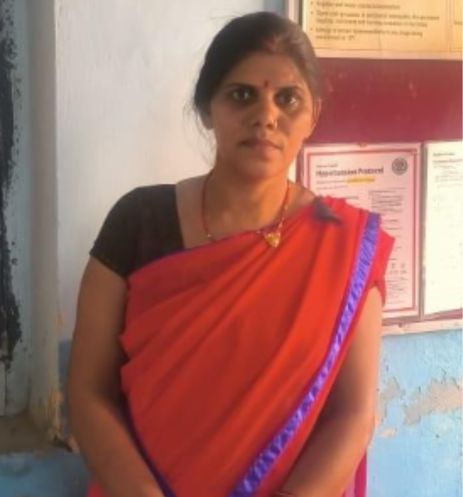
Lila Ahirwar, an Accredited Social Health Activist (ASHA) working in the UPHC TIT Road, Ratlam, Madhya Pradesh. She is known for her determination and commitment. Faced with persistently low male participation in family planning, she decided to lead change.
I have always believed in the words that ‘Family planning is a shared responsibility’. My knowledge deepened further when PSI India team supported us through training on family planning. During training sessions, the stark reality of low male participation came up again and again. That’s when I decided—if I want change, I must start from my own home.”
Lila Ahirwar
ASHA, Ratlam, Madhya Pradesh
In India male participation in family planning has always remained extremely low. Deep-rooted myths, hesitation, and lack of awareness often prevent men from opting for procedures like NSV (No-Scalpel Vasectomy).
Lila, seeing minimal response from men despite her outreach, decided to lead by example. With quiet courage, she initiated an honest conversation with her husband about the benefits of NSV, explaining the procedure and its safety. Though unsure initially, he listened, asked questions, and gradually gained trust in her guidance. Eventually, he agreed.
Lila shared- “I arranged his consultation and visit at the district hospital. With professional’s guidance, he opted for NSV. Just as I had reassured him, he resumed his daily activities within days.”
His smooth experience became a powerful example and proof that Lila’s counselling was grounded in real knowledge and real results. With this confidence, Lila intensified her male counselling efforts. She encouraged her husband to speak to other men, sharing his firsthand experience. This shifted attitudes instantly. Men who were previously resistant began listening more openly, and two community members even went on to adopt NSV.
Today, Lila’s experience stands as a model of personal and professional dedication. With PSI India’s ongoing support, frontline workers like Lila are promoting informed choice and fostering an environment where family planning truly becomes a shared responsibility.
When Hope Knocked the Door
Contributors: Naveen Kumar Bansal, Deepti Mathur, Parul Saxena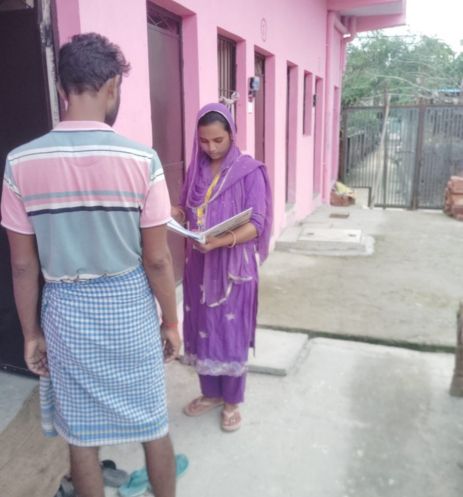
Mukesh, a 38-year-old daily wage laborer from Jalpura village in Gautam Buddha Nagar, struggled to support his wife and four children by selling peanuts. When persistent coughing and fever began to rob him of his strength and his only source of income—fear and helplessness took over. His journey from desperation to recovery reflects the power of timely diagnosis, community support, and compassionate intervention.
I am thankful to PSI India workers and government, they stood by me when I had no one to turn to. Today, I can dream of working again, of caring for my family.”
Mukesh
Gautam Buddha Nagar, Uttar Pradesh
Tuberculosis continues to affect thousands of vulnerable families across India, especially those who cannot afford private healthcare. Delayed diagnosis, lack of awareness, stigma, and financial constraints often worsen the condition. Government programs such as the National TB Elimination Program (NTEP), along with nutrition and counselling support, play a critical role in ensuring treatment adherence and recovery.
For weeks, Mukesh ignored his worsening cough, believing it was just a stubborn fever. He couldn’t afford private treatment, and his weakness grew each day. His wife watched helplessly as their only breadwinner struggled.
Hope arrived when PSI India’s community mobiliser visited Jalpura for routine TB screening. After speaking with Mukesh’s worried wife, they identified the symptoms and provided a sputum collection container. Though the first test was negative, Mukesh’s condition didn’t improve. The mobiliser referred him to the Community Health Centre in Bishrakh, where a Nucleic Acid Amplification Test confirmed pulmonary TB.
Mukesh was enrolled under NTEP and immediately started Anti-TB Therapy. PSI India also assisted him in applying for Nikshay Poshan Yojana to receive monthly nutritional support. The team further coordinated with RAHAM Foundation, which adopted Mukesh as a Nikshay Mitra, providing regular nutrition kits to aid his recovery.
Overwhelmed, Mukesh said, “I didn’t know anyone would step forward for me like this, these kits and support kept me strong when I could barely stand.”
With treatment, nutritional support, and regular follow-ups, Mukesh’s health steadily improved. He completed 56 doses in the Intensive Phase and has now entered the Continuation Phase with renewed strength and hope.
Through PSI India’s TB-Strive project, patients are being reached at their doorstep, connected to free care, and supported to restore health, dignity, and hope in their fight against TB.
Diarrhoea Se Darr Nahi: Empowering Mothers, Saving Lives
Contributors: Anil Kumar Dwivedi, Amit Kumar, Deepti Mathur, Parul Saxena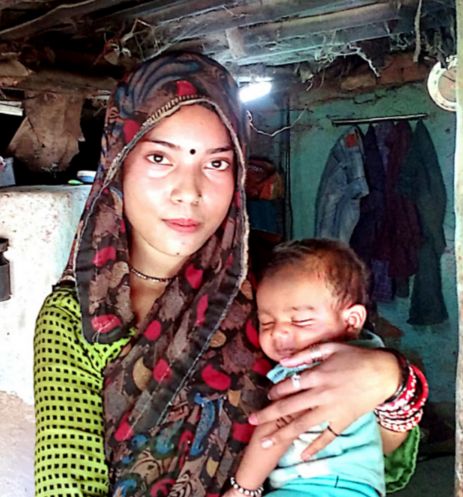
Suman, a young mother from Moradabad, Uttar Pradesh, had always relied on family advice for her child’s wellbeing. But when her baby fell severely ill with diarrhoea, she was overwhelmed with fear and uncertainty. Her journey reflects the experiences of many mothers who learn life-saving practices through timely medical guidance and community health support.
I didn’t know that a simple ORS packet could be a life saviour. When the doctor explained it to me, it felt like a light switched on inside me. I realized that this small packet could protect my child and give me the strength and confidence I was missing as a mother”
Suman
Moradabad, Uttar Pradesh
Diarrhoea remains one of the leading causes of illness among children under five in India. Many mothers, especially in underserved communities, lack awareness about the early signs, dangers of dehydration, and simple, effective solutions like ORS and Zinc. Misinformation, traditional practices, and hesitation in seeking timely care often worsen the child’s condition.
One morning, Suman rushed into the ESI Town Hall health center in Moradabad, holding her crying, weakened baby. The child had been passing frequent loose stools, and panic had taken over.
Dr. Raj Dulari examined the baby gently and asked, “Did you give ORS solution?” Suman shook her head, embarrassed. “I have heard of ORS, but I didn’t know it actually works.”
With calm assurance, Dr. Dulari explained, “If a child passes loose stools more than three times a day, it’s diarrhoea. The first and most important treatment is ORS, it prevents dehydration and protects the child.” Relief slowly replaced Suman’s fear as she realized she had been unaware of the simplest remedy.
She admitted softly, “Neither my husband nor my in-laws told me ORS could make my baby safe.”
Dr. Dulari handed her ORS and Zinc tablets and guided her on breastfeeding and hygiene. She emphasized how Accredited Social Health Activists (ASHAs) not only provide these supplies but also educate families on correct dosage and usage.
Suman left the health center not just with medicines, but with confidence and clarity, knowing that a small packet of ORS could safeguard her child’s life.
Her story mirrors that of countless mothers across PSI India’s intervention districts, who are learning that ‘diarrhoea se darr nahi’, especially when armed with knowledge, support, and timely care.
ASHA Helps a Young Mother Survive Severe Anemia and Access MNCH Services
Contributors: Priyanka Singh, Keval Singh Sisodiya, Amit Kumar, Deepti Mathur, Parul Saxena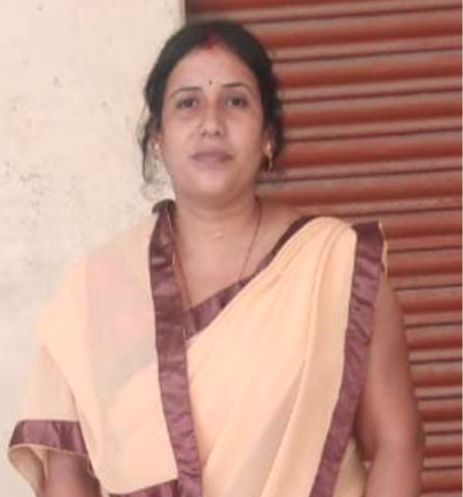
Babita Pal, an Accredited Social Health Activist (ASHA) at Hanuman Nagar Urban Primary Health Center (UPHC) in Mau, Uttar Pradesh, is known for her commitment to the health of women and children in her community. Beyond routine home visits, she actively mobilizes Mahila Arogya Samiti (MAS) members to spread awareness on maternal, newborn, and child health (MNCH) and family planning. Her compassion and vigilance have made her a lifeline for vulnerable women.
Dhara delivered a healthy baby girl. When I went to see her after delivery, tears welled up in her eyes. She thanked me not for helping her have a safe, normal delivery. She was very happy because after two sons, the birth of her daughter felt like a long-awaited blessing.”
Babita Pal
ASHA, Mau, Uttar Pradesh
Anaemia is a leading cause of maternal complications in India, often going unnoticed in early pregnancy. Many women, especially from underserved communities, face risks due to lack of awareness and hesitation to seek timely care. ASHA workers play a crucial role in identifying danger signs, ensuring Antenatal Care (ANC) check-ups, and guiding families toward safe motherhood.
During a MAS supported group meeting for pregnant women, Babita noticed a pale and fragile young woman, 26-year-old, Dhara Raj, pregnant with her third child. Concerned, Babita visited her home and learned that Dhara, barely a month into pregnancy, was already struggling with extreme weakness. Her husband Aakash did not understand the seriousness of her condition.
Babita convinced the couple to visit the District Women’s Hospital. The diagnosis was alarming, Dhara’s hemoglobin level was just 6 g/dL. The gynecologist warned that continuing the pregnancy posed severe risks. While Dhara felt confused and scared, Aakash insisted on continuing.
As a trained PSI India coachee, Babita acted quickly. She discovered Dhara had never registered for antenatal care. She immediately facilitated her ANC registration and accompanied her to the hospital for urgent anaemia treatment. Even when Dhara experienced nausea and vomiting after starting medication, Babita took her to the UPHC, where the medical officer in-charge patiently counselled her on the importance of continuing supplements and adopting a nutritious diet.
With Babita’s support, Dhara regained strength, completed all four ANC check-ups for the first time, and consistently took iron and calcium, something she had missed in previous pregnancies.
Dhara delivered a healthy baby girl. With tears in her eyes, she thanked Babita for safeguarding her life and helping her welcome a daughter she considered a blessing after two sons. After counselling, Dhara also opted for a postpartum IUCD and pledged to ensure complete immunization for her newborn.
Igniting Community Women to Solve Their Problems on Their Own
Contributors: Sanjeev Pandey, Amit Kumar, Deepti Mathur, Parul Saxena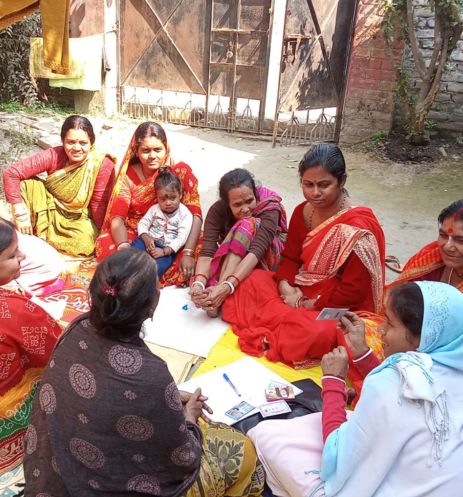
Malti, an Accredited Social Health Activist (ASHA) from Motihari in East Champaran, Bihar, began her journey with a simple yet powerful mission: to help her community thrive. Known for her determination and empathetic communication, she has become a trusted bridge between the health system and vulnerable urban slum communities.
In every Urban Primary Health Centre (UPHC) monthly meeting, we receive guidance to promote certain activities and awareness in the community. Formation and strengthening of Mahila Arogya Samitis was one such priority area for me. Initially, it appeared challenging. But the coaching and mentoring support I received from my Medical Officer In-charge (MOIC) and PSI India helped me achieve this."
Malti
ASHA, East Champaran, Bihar
ASHAs are central to the design and strategy of the National Health Mission (NHM). As grassroots health workers, they promote essential services, including family planning, immunization, disease prevention, and community mobilization. However, engaging communities can be difficult. Social hesitation, lack of awareness, and mistrust often prevent people from openly discussing their health needs. Strengthening MAS is one of NHM’s core strategies to address these challenges through women-led collective action.
Malti was once assigned by the UPHC Chattauni MOIC to identify slum areas where she had previously worked. Although she was familiar with the community, the residents were initially reluctant to talk about their health concerns. With patience and consistent interaction, she slowly built trust, discussing family planning methods, government health schemes, outreach camps, and UHSND activities.
During her visits, she identified women interested in learning more and encouraged them to form a MAS groups. Many women hesitated due to a lack of confidence, but Malti’s encouragement gradually motivated them to step forward. With her persistence, MAS in Chattauni was formed, creating a strong platform for community engagement.
Malti explains, “Activating the MAS in the Chattauni area has not only empowered the women, but it has empowered me too. Today, women reach out to me on their own, whether they want to join the MAS group or need support with any health service, especially family planning. Knowing that they trust me and see me as their guide fills me with immense hope and pride.”
Through Malti’s efforts and with PSI India’s support the women of Chattauni are now taking charge of their health, proving that empowered communities can solve their own problems.
A New Beginning for Sujata: The Power of Counseling and Support
Contributors: Chandani Verma, Vivek Dwivedi, Deepti Mathur, Parul Saxena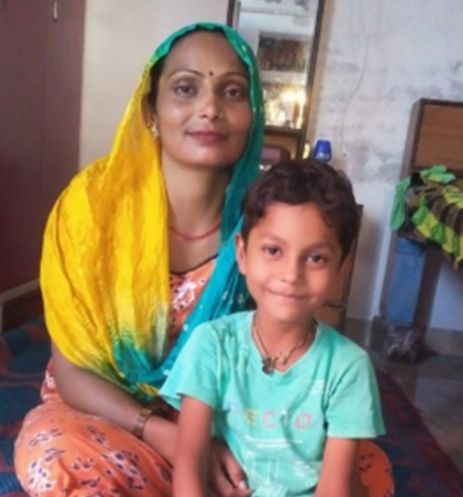
Sujata, a 22-year-old mother of two from Agra, Uttar Pradesh, was struggling with repeated unintended pregnancies. Determined to take control of her health, she sought answers even when her husband was unwilling to engage in conversations about contraception.
Mujhe saadhan ki jaankari nahi thi, mere pati ko bhi nahi thi. Lekin mai jaankari lena chahti thi par mere pati nahi. (I didn’t have any information about contraception, and neither did my husband. But I wanted to learn, whereas my husband was unwilling and against it.)”
Sujata
Family planning beneficiary. Agra, Uttar Pradesh
Financial constraints, partner resistance, and social norms often stop young women from seeking services, resulting in unintended pregnancies and health complications.
Sujata’s turning point came when she met the UAQ program team and shared that she wanted to adopt a method, but her husband, Sunil, was strongly against family planning.
Understanding the situation, the UAQ team engaged Sunil in a patient and informative discussion. Initially hesitant, he opened up about his concerns: “We didn’t have the resources to afford it,” he admitted. When he learned that the Saral Labh Package covered all methods at no cost at private facilities, his stance shifted.
Couple leveraged the benefit of the Saral Labh Package, and Sujata received free contraceptive services from a private facility of her choice. “I chose the injectable (DMPA) because it helps maintain spacing between my children and also gives me the chance to meet a gynecologist every three months to discuss my health concerns. It was the best choice for me,” Sujata shares with relief.
Through initiatives like UAQ, PSI India is opening doors for couples like Sujata and Sunil, giving them access to information, affordable options, and the confidence to plan more secure future for their families.
A Catalyst for Change
Contributors: Dinesh Kumar Pandey, Deepti Mathur, Parul Saxena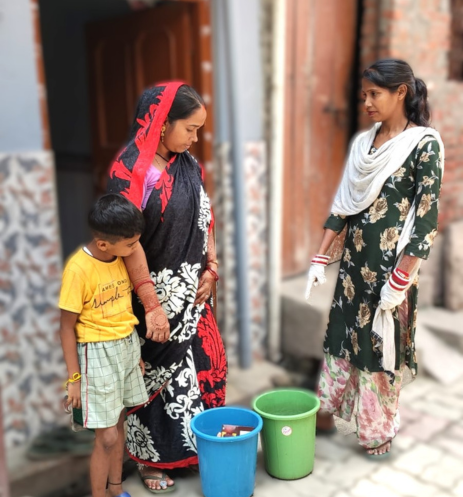
Shweta Kashyap, 28 years old, resides in Gudiyan Tola, Daliganj ward of Lucknow with her husband and their three-year-old daughter. Shweta is a dynamic community member, offering invaluable assistance to her community people. Her contributions include aiding people in applying for ration cards, pensions, and Ayushman Bharat cards, as well as helping them access various government schemes. Shweta's unwavering support has earned her immense love and respect within the community.
"When I saw waste piling up in every corner of our neighborhood, I knew I had to take action. It wasn’t easy convincing everyone to pay the collection fee, but I explained that keeping our surroundings clean was for our health and future. Today, seeing Gudiyan Tola clean makes me proud of what we achieved together as a community."
Shweta Kashyap
Lucknow, Uttar Pradesh
Population Services International (PSI) India is implementing the Swachh Uday program across 16 wards in Lucknow city, including Daliganj. This initiative focuses on Water, Sanitation and Hygiene (WASH) practices, including waste segregation and disposal in line with the Government of India's Swachh Bharat Mission norms.
Initially, implementing Swachh Uday interventions in Gudiyan Tola was challenging, as the community was reluctant to pay the fifty-rupee fee to LNN for door-to-door waste collection. Consequently, household waste was being disposed of in nearby vacant plots and public spaces, resulting in waste heaps throughout Gudiyan Tola.
Shweta Kashyap played a pivotal role in establishing a door-to-door waste collection service and eliminating Garbage Vulnerable Points (GVP) by registering complaints on the Lucknow One app. She, along with LNN sweepers, visited every household in Gudiyan Tola to emphasize the importance of proper waste disposal. Shweta initiated the collection of fees from each household, remitting payments to LNN on behalf of the community. Thanks to her efforts, the door-to-door waste collection service now operates seamlessly without interruption. Today, the Gudiyan Tola community directly pays waste collection charges to LNN, and there is not a single GVP remaining in the area. Shweta and her fellow Swachhata Samiti members, encouraging community to segregate dry and wet waste at the source. Her relentless dedication has resulted in a noticeable improvement in cleanliness throughout Gudiyan Tola, Daliganj ward in Lucknow.
Choice Empowered by Quality Counselling
Contributors: Manish Saxena, Manish Bhardwaj, Prem Ranjan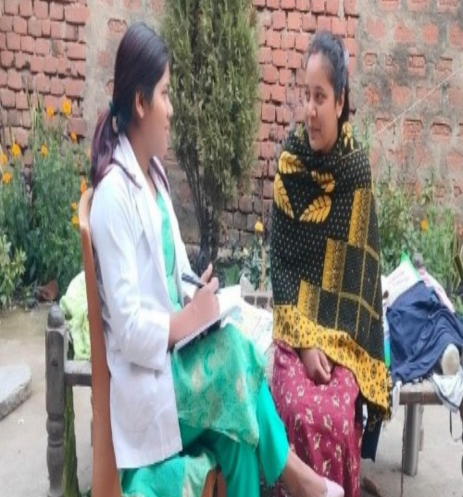
On the vibrant morning of Aarogya Diwas, the Health and Wellness Centre (HWC) team from Samas, Sheikhpura, Bihar, ventured out to the nearby Anganwadi Centre. Among them was Jyoti Kumari, the compassionate Community Health Officer (CHO).
My day began as it always does, attending to patients, but on Aarogya Diwas, the focus was to utilize the opportunity of creating awareness among parents, people who had arrived for vaccination needs of their children.
Jyoti Kumari
Community Health Officer, HWC Samas, Sheikhpura, Bihar
Amidst this, she encountered Nisha Kumari, a young woman of twenty, who had recently entered wedlock. Nisha shared that she was there to seek vaccinations for her niece, yet harbored reservations about conceiving too soon. Understanding her shyness yet sensing her need, Jyoti delved into a detailed discussion, presenting her with a spectrum of contraceptive choices tailored to her needs.
Nisha expressed, "I was uncertain about using contraception immediately after marriage, but the HWC team counsel opened my eyes to the possibilities, and after deliberation with my husband, we chose MPA-SC. I found it easier than oral pills as it was to be taken daily/weekly. The assurance of ease in administration of MPA-SC convinced me”.
In embracing DMPA-SC, Nisha not only safeguarded her reproductive health but also laid the foundation for a future brimming with promise and opportunity.
Dr. Meghna Sharma’s Unwavering Commitment to Strengthen Health Care Beyond the Boundaries of Agra
Contributors: Anil Dwivedi, Sonal, Ipsha Singh, Amit Kumar, and Parul Saxena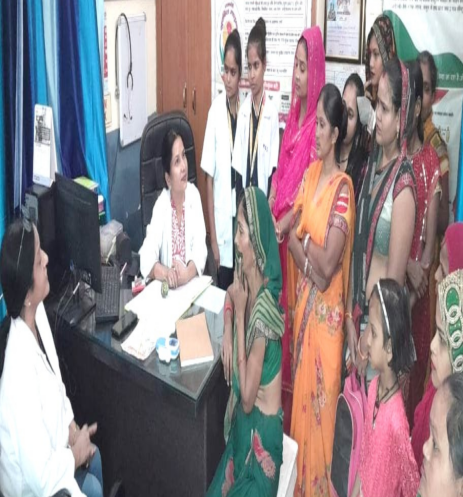
Agra, a The Challenge Initiative (TCI) graduated city in Uttar Pradesh, has emerged as a leader in healthcare advancements, thanks in large part to the dedicated work of its TCI India-trained master coaches. Among them, Dr. Meghna Sharma stands out as a true visionary leader. As the Medical Officer in Charge of the Jeoni Mandi Urban Primary Health Center (UPHC) and a TCI Master Coach, her relentless commitment has transformed the facility into a model UPHC, garnering both national and international recognition.
My team is my strength. I believe in TCI’s coaching model and regularly coach them, extending it beyond my UPHC. I attend Mahila Aarogya Samiti meetings to build capacities, conduct field visits to understand ground realities, and provide support. During Urban Health and Nutrition Day sessions, I empower ANMs and counsel couples to motivate them to adopt a family planning method of their choice.
Dr. Meghna Sharma
Medical Officer in Charge, Jeoni Mandi UPHC, Agra, Uttar Pradesh
Before Antral Diwas (fixed day static services), Dr. Meghna organized facility-level meetings to ensure no client faced any issues when seeking family planning services. She explained her approach: “We utilize the due list prepared by Accredited Social Health Activists (ASHAs) to make all necessary arrangements, ensuring high service satisfaction levels among beneficiaries who, in turn, encourage their peers to avail services from our UPHC.”
“People often ignore their health, especially women. To raise awareness, my UPHC staff and I, along with other stakeholders, have developed easy-to-understand pictorial posters on combating anemia and nutrition during pregnancy. To further promote healthy practices from a young age, I ensure that adolescent girls and boys participate in facility-based Adolescent Health Days. During these events, they receive comprehensive screening and counseling services covering nutrition, sexual and reproductive health, mental health, and prevention of non-communicable diseases. In collaboration with ASHAs, I also enlist the support of MAS members, local influencers, and self-help groups to encourage boys and girls to attend the Adolescent Health Days, which are organized on the 8th of every month.”
Dr. Meghna’s dedication and innovative approach have made her an inspiration to many, both in Agra and beyond.
ASHA Sunita Devi Challenges Gender Norms to Engage Men in Family Planning in Bijnor
Contributors: Mange Ram, Kavita, Ipsha Singh, Amit Kumar and Parul Saxena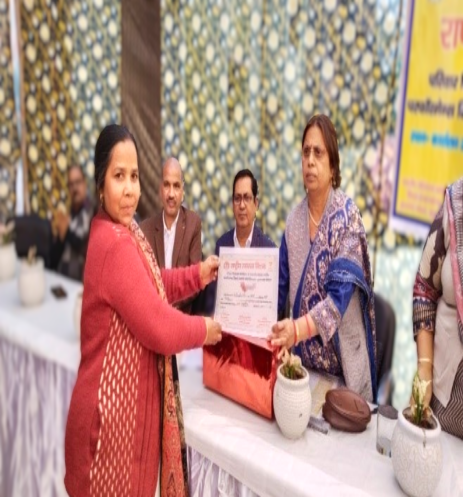
Sunita Devi is an Accredited Social Health Activist (ASHA) from Ravidas Nagar, Bijnor. At a recent urban primary health center (UPHC) meeting, she excitedly shared how she succeeded in convincing men to undergo non-scalpel vasectomies (NSV) while increasing male engagement in family planning. She explained how her approach involves challenging traditional gender norms and promoting shared responsibility.
Known for my regular interactions, I prepared for the NSV campaign by listing households needing family planning. Revisiting men I had previously counseled, I approached them with renewed dedication, motivating them to come with me to the district hospital for NSV procedures.
Sunita Devi
ASHA, Ravidas Nagar, Bijnor
Sunita confidently approached men directly, engaging them in open discussions about family planning options and providing informative pamphlets to dispel misconceptions. She addressed the myths surrounding NSV, emphasizing that by choosing the procedure, men could actively share in the responsibility of family planning as a gesture of love and support for their wives. Sunita also involved the women in these conversations, encouraging joint decision-making and fostering a sense of partnership in planning their families’ futures.
Sunita continues- “I was surprised to observe more and more men sitting with their wives and participating in taking a mutually beneficial family planning option. I also observed many men behaving sensitively when their wives chose any female contraceptive. Most of all, one day during the fortnight, fourteen men adopted the NSV method from the district hospital, five of whom were directly contacted by me for adopting the family planning method.”
Sunita realized that this success stemmed from involving men not merely as participants, but as equal partners in family planning decisions. As a result, men independently reached out to her for more information about NSV and then discussed family planning options with their wives, leading to an increase in women adopting methods of their choice.
With support from The Challenge Initiative (TCI), master coaches trained UPHC staff and all urban ASHAs in Bijnor to engage the community through one-on-one counseling and pamphlet distribution, effectively raising awareness about the NSV campaign.
Dr. Geetanjali’s Empowers Youth through Her Sensitive Approach to SRH Issues
Contributors: Deepak Kumar Tiwari, Ipsha Singh, Deepti Mathur, Parul Saxena
In the heart of Chitwapur, Lucknow, the Urban Family Welfare Center stands as a beacon of health, thanks to the transformative efforts of Dr. Geetanjali Singh. Her prowess lies not just in her medical expertise but in her unique ability to connect health issues to the whole person, not just their sickness. She has made the center famous for helping families with health check-ups, vaccinations, family planning, and even screening for cervical cancer. One of her memorable contributions is her ability to talk to husbands and wives about family planning. She believes it is essential for couples to make decisions together.
Even though many couples want information about contraceptives, we need to help more men get involved. Some are shy about talking about it, and we need to break the taboo around it.
Dr. Geetanjali Singh, Urban Family Welfare Center
Chitwapur, Lucknow
Her dedication extends beyond the confines of the health center, especially when addressing the delicate issues of adolescent health.
Realizing that boys are not easily open to discussing sexual issues, Dr. Geetanjali extends her reach into schools and colleges, engaging boys above class eight in open discussions on crucial topics. Her efforts are transformative; the footfall of boys seeking information and guidance increases significantly.
"When a boy visits, I ensure him that things will remain confidential. I have placed a condom box outside the facility, fostering a stigma-free environment where young individuals can access condoms without hesitation. This has increased the footfall of boys, who now bring their friends to the center for discussions on mental and sexual health," shares Dr. Geetanjali.
Dr. Geetanjali Singh's dedication exemplifies the profound impact one individual can have on the well-being of an entire community, transforming healthcare from a service to a shared journey toward a healthier, more connected society. TCI India is proud to work with her in Chitwapur, Lucknow, Uttar Pradesh.
Words of Her Own: She is No More Concerned About an Unexpected Pregnancy
Contributors: Umam Farooq, Vivek Dwivedi, Deepti Mathur, Parul Saxena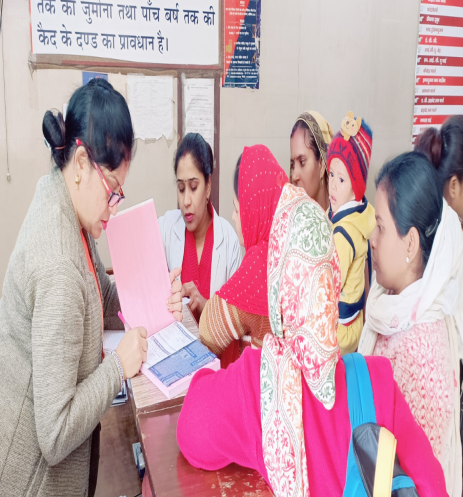
Population Services International (PSI) India is implementing the Universal Access to Quality (UAQ) Contraception project in Agra, Uttar Pradesh, known as SARAL, which translates to 'simple' in Hindi. This project creates a holistic, client-centered, and consumer-empowering atmosphere. The following is the story of Minesh. Her experience illustrates how underprivileged women in Agra are reaping the advantages of the 'Saral Labh Package,' a strategic purchasing initiative of PSI India.
There was a time in my life when I worried about the chance of another pregnancy. Every month, I found myself agonizing over the same question: Will I get my period?
Minesh
Resident, Agra, Uttar Pradesh
It was during this uncertain time that I had the fortune of meeting UAQ project workers who introduced me to modern contraceptive methods. They also enlightened me about the availability of these services in both private and government hospitals.
I aspired to opt for a contraceptive method from a private facility, but the financial burden was a significant deterrent. I confided in the PSI India worker about my predicament, and that's when I learned about the 'Saral Labh Package.'
I discussed about package with my husband, and together, from the family planning basket of choice we decided to opt injectable contraceptive services offered by Care Well Hospital, which was part of the package. At Care Well Hospital, we had the privilege of meeting Dr. Ranju Sharma. She not only explained the advantages and effectiveness of each contraceptive method but also patiently addressed all my queries and concerns.
I am immensely thankful to the UAQ team for their unwavering support and guidance, which enabled me to overcome my fears. This experience has empowered me to take control of my reproductive health, ensuring a brighter and more secure future for my family.
Toilet Triumph in Lucknow
Contributors: Dinesh Kumar Pandey, Deepti Mathur, Parul Saxena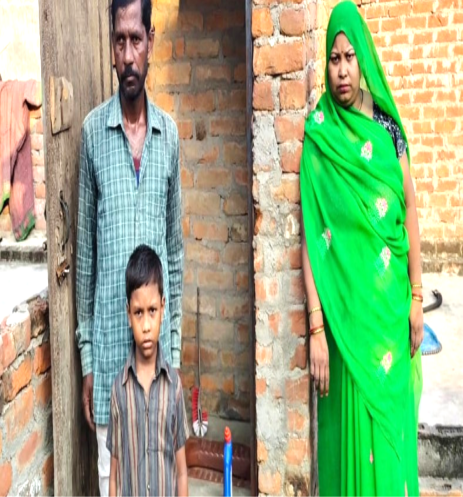
Rajjan Nishad, a construction site helper residing in the quaint Ruppur Khadra Mohalla, Ayodhya Das Ward, Lucknow, Uttar Pradesh, faced a significant challenge due to the absence of a toilet in his home. Although he had previously applied for toilet construction under the Swachh Bharat Mission scheme, his application was denied due to the lack of space in his house. This dilemma brought a daily struggle, resorting to open defecation and contributing to an unhygienic environment in their community. The remote location of public toilets and associated user charges only added to his family's plight.
I understand that many individuals borrow funds for their children's education and weddings. Borrowing money for a toilet may seem awkward but I recognize the importance of proper sanitation facilities for family. I'm glad I took the initiative.
Rajjan Nishad
Resident Ruppur Khadra Mohalla, Lucknow, Uttar Pradesh
During a field visit to Ruppur Khadra Mohalla, the team from Population Services India (PSI) India discovered Rajjan's predicament and embarked on multiple visits to his home. Motivated by the PSI India team members, Rajjan overcame initial difficulties in garnering support from neighbors and relatives, and he courageously borrowed Rs. 20,000 and successfully built a toilet.
Rajjan shared, “I have already repaid fifty percent of our debt by saving diligently, and I will soon repay the rest.” Rajjan's commitment not only improved his living conditions but also inspired other parents, resulting in a significant reduction in open defecation by children in the area.
From Struggles to Success: Ameen’s Triumph in Sanitation Advocacy
Contributors: Dinesh Kumar Pandey, Deepti Mathur, Parul Saxena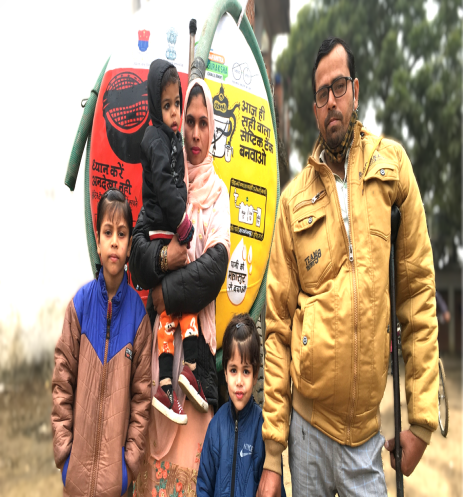
Mohammed Ameen and his wife Sabina, lives in Lucknow with their three children, faced various hardships. Ameen, who has physical disability, faced difficulty supporting his family due to his inconsistent income from sporadic jobs. With limited prospects, he made the decision to start pit cleaning work, involving the cleaning and disposal of septic system waste. However, he quickly encountered significant difficulties in this new endeavour because, in India, private sector pit cleaners face acceptance issues for various reasons. However, fate took a turn for the better when Population Services International (PSI) India launched its Maverick Collective sanitation project, "After the Flush" (ATF), in Uttar Pradesh and Madhya Pradesh.
Joining the ATF project gave me the chance to turn our struggles into strength. Today, as Vice President of the Pit Cleaner Association, I’m proud that we’ve gained government recognition and access to safe disposal systems. Together, we’re building better lives and a cleaner future for our city.
Mohammed Ameen
Vice President of the Pit Cleaner Association, Lucknow, Uttar Pradesh
ATF project aimed to address the issue of unsafe waste disposal by organizing and training private sector pit cleaners like Ameen. Encouraged by this new opportunity, Ameen and Sabina decided to revive their business, Sabina even sold her jewellery to finance the purchase of a new tanker. Ameen swiftly became an integral part of the ATF project. He took the initiative to establish a Pit Cleaner Association, with the goal of advocating for government recognition, developing safety protocols and training.
Under his strong leadership, the association earned government recognition and leading to regular meetings. These meetings provided a platform to raise and discuss issues and seek solutions.
Through collective bargaining, Ameen and his fellow pit cleaners gained access to government sanitation treatment plants, allowing them to dispose of waste safely. This transformative change empowered them to build sustainable and thriving businesses. Ameen's journey from adversity to advocacy not only transformed his own life but also brought about positive changes for pit cleaners in Lucknow.
Putting our shoulders together for enhancing COVID 19 vaccination
Contributors: Trupti Sharma, Deepti Mathur and Hitesh Sahni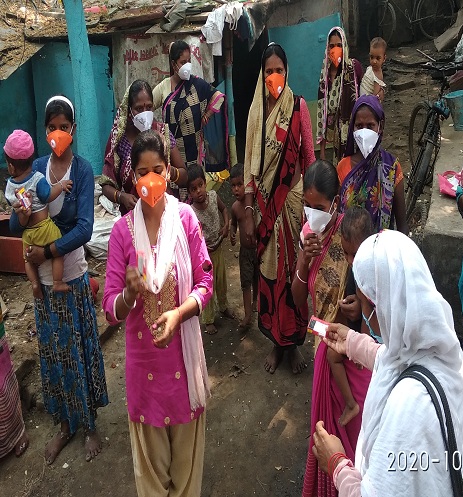
As the world anxiously awaited the development of COVID-19 vaccines, there was also growing concern about vaccine hesitancy and even anti-vaccine attitudes in people that could significantly dent the government’s nation-wide coronavirus vaccination campaign. Not that vaccine hesitancy was without a reason: from vaccine side effects and safety, lack of trust in the process, and fear amongest high-risk individuals like diabetics and hypertensive patients – there was a long list of reasons why people were reluctant to be vaccinated. Jagdish Verma, 66, was one of them.
Retired from government service and a resident of Indore, Jagdish was also a diabetic (Diabetes Mellitus). The Samagra team, during a visit to the community, met Jagdish where he confessed his apprehension about the vaccine, especially since he was told it could interfere with his diabetes medication.
To address Jagdish’s hesitation, the team felt it necessary to talk to him about the added risk in contracting COVID 19 given his underlying diabetic condition. This was part of the overall strategy by Samagra to disaggregating populations by their reasons for hesitancy and then address these barriers, often by making them part of support groups to bring about behaviour change in those hesitating to take the vaccine.
who was already under treatment for diabetes and was also one of the
early adopters of the COVID-19 vaccine
Thus, not only was Jagdish convinced about visiting the UPHC, but the Samagra FPA and ASHA continued their follow-up visits to further motivate him for vaccination.
After two weeks of follow-up by the ASHA, Jagdish agreed to take the vaccine. Today, Jagdish is a COVID-19 vaccine champion in his community and encourages his friends and neighbours to get vaccinated. It is this team work like this that has made Indore the first million-plus population district in the country to achieve 100 per cent coverage by the first-dose of the COVID vaccine.
A critical outcome objective of the Samagra project is to improve acceptance of the COVID 19 vaccine among the slum population of Indore, through improved knowledge of COVID vaccines, improved risk perception, and self-efficacy. The project’s coaches, field program associates (FPA) work with FLWs to conduct extensive and well-managed community engagement. One of the strategies that the Samagra team advocates with the FLWs are to proactively release timely information on vaccine modalities to disaggregated populations in the community, including high-risk individuals undergoing care for comorbidities.
Nothing Stops This Gaya ANM from Providing Family Planning Counselling
Contributors: Ajay Kumar, Deepika Anshu Bara, Parul Saxena and Archana Mishra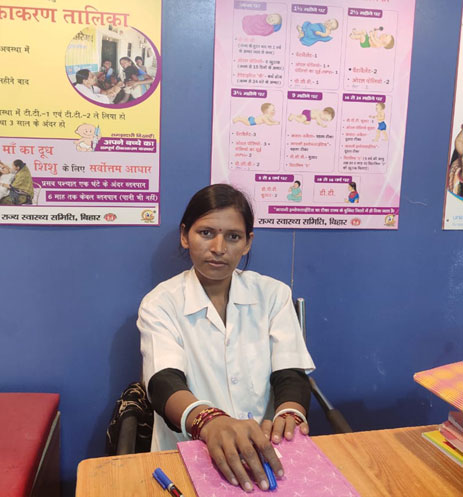
Sandhya Kumari is an auxiliary nurse midwife (ANM) at the Iqbal Nagar urban primary health center (UPHC) in Gaya, Bihar. She has a disability that makes walking difficult, but her determination and diligence inspires others. As a person with disability, Sandhya was initially a little apprehensive about how the communities would respond, but over time, everyone in the community learned that she could provide them with family planning services. She alone has motivated many women to use long-acting reversible contraception (LARC) and other short-term methods.
I was initially apprehensive about community responses, but over time, they recognized my ability to offer family planning services. I have personally encouraged many women to use LARC and other methods. Although I lacked formal training, I started providing contraceptive counseling based on my nursing course and recent learnings from the TCI India team.
Sandhya Kumari, ANM
Gaya, Bihar
"Sandhya continues, Similarly, urban ASHAs, like me, have not received any family planning training. I support them by providing onsite handholding support and by demonstrating family planning counseling skills. I do field visits to personally counsel eligible couples and mothers who have more than two children. Despite my physical condition, which makes walking difficult, I visit the urban poor who live in Gaya’s mountainous area."
"Observing women accept family planning methods keeps me motivated. People usually ask me how I manage my travel and family planning work, but I owe it to almighty, my family and to the TCI India team, who have supported and mentored me. Today, many women on their own reach out to me for family planning related information and services.
This award has overwhelmed me, I can never believe a person who requires assistance can help someone else with a decision that is so important, like family planning.”
Strategic Purchase Initiatives Empowering Lives of Urban Poor
Contributors: Umam Farooq, Vivek Dwivedi, Parul Saxena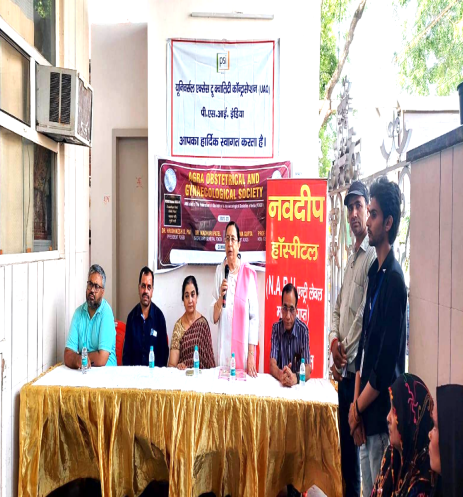
In the heart of Agra's Azampada slum, where challenges seemed insurmountable, Rukhsar, 25, and her husband Mohammad Ali, 32, found resilience and hope. Their story took a positive turn when Population Services International (PSI) India introduced the Universal Access to Quality (UAQ) Contraception project in Agra.
I had no idea that people like me could get free family planning services from such a big hospital. I am happy to get this service and I feel many women will benefit from the Saral Labh package from private facilities as along with the choice of family planning methods, we get the choice of selecting a provider also.
Rukhsar
Beneficiary, Agra, Uttar Pradesh
During a home visit, PSI India’s UAQ team discovered Rukhsar's story. Having experienced a previous abortion, Rukhsar was reluctant to have another child. Introduced to the Saral Benefit Package, she found relief in accessing family planning services at a private hospital without a financial burden.
Excited about the newfound possibilities, Rukhsar clarified her doubts related to family planning methods and sought information on nearby hospitals covered under the Saral Benefit Package. A week later, she went with her husband to a family planning awareness camp of a private hospital of her choice, where she opted for a long-acting revisable contraceptive method.
A High-Spirited Staff Nurse in Mathura Creates a Beneficiary Chain Through Word of Mouth
Contributors: Shailesh Tiwari and Parul Saxena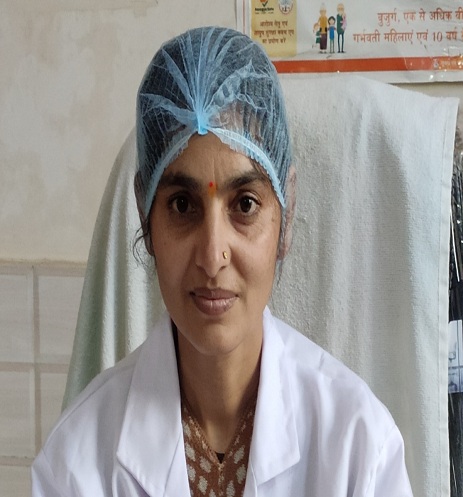
As a staff nurse at the Laxminagar urban primary health center (UPHC) in Mathura, Uttar Pradesh, Kashmiri is paving the way for women there to learn more about reproductive health and make family planning decisions. Her passion for her work can be felt as she tells the following story:
“When Poonam came to UPHC seeking medical treatment, I talked to her about family planning. She wanted to space her next pregnancy, but because of myths and misconceptions she never did. I clarified each of her myths and explained the effectiveness of various contraceptive methods from the basket of choice. I also shared videos of satisfied family planning users over her WhatsApp number. Later, Poonam opted for a method of her choice.”
Kashmiri, Staff Nurse
Laxminagar UPHC, Mathura, Uttar Pradesh
Poonam returned to the facility a few days later, this time accompanied by her younger sister Devaki, who received a long-acting reversible contraceptive (LARC) method from the Laxminagar UPHC.
Kashmiri continued:
was accompanied by her sister-in-law Manju. They had
learnt about Poonam’s good experience and now both
wanted a LARC method for themselves.”
Manju persuaded her next-door neighborUsha also. But her husband was apprehensive. Kashmiri counseled and persuaded them to use a family planning method of their choice. Manju also accepted a family planning method.
Kashmiri feels proud that her sincere efforts of counseling clients, dispelling myths and giving clear information about each method has spread the word about the benefits of family planning in the surrounding community.
A Learning in Time Saves Lives
Contributors: Deepti Mathur and Hitesh Sahni
Vijay Sekhar Reddy lives in Chintapenta village, Penumurumandal in Chittoor district in the south Indian state of Andhra Pradesh. Along with his own family, his elderly parents also live with him. Vijay Sekhar is the sole breadwinner for his family, earning a small living from farming; it is not surprising, therefore, to see him make repeated trips to Chittoor to buy seeds, manure and other agriculture-related inputs for his farm. So much so he was even forced to travel to Chittoor during the COVID-19 pandemic, since his livelihood depended on ensuring timely agricultural inputs to the crops throughout the cropping season.
I knew about COVID-19 precautions but didn’t take them seriously. With my frequent trips for farm supplies, I constantly worried about bringing the virus home. PSI India volunteer helped me understand the importance of safety precautions for corona including proper handwashing with soap. Now, my family washes hands regularly, and we have all been vaccinated to stay safe.
Vijay Sekhar
Chintapenta, Penumurumandal, Andhra Pradesh
So, it was with a great sense of relief that he met a PSI India Hygiene Volunteer during his house-to-house calls for awareness generation in communities on COVID-19 preventive behavior (like handwashing, etc.). Vijay Sekhar says while he was already aware of preventive aspects like using masks, sanitizer, hand washing, and social distancing from watching television, he rarely took the recommended precautions seriously and did not practice them in his everyday routine.
But every time he travelled, Vijay Sekhar always worried about catching Coronavirus disease’ more than that, he was mortally afraid of passing on the illness to members of his family, especially his elderly parents.
That is why the conversation with the PSI India Volunteer was all the more revealing – not only did his knowledge about transmission of COVID-19 increase, he was convinced that following desired preventive behavior like maintaining social distance, using masks, and hand washing frequently, etc. More importantly, Vijay Sekhar came to realise that the best way to keep himself and his family safe was hand washing using soap, not just hand washing with water. Following the discussion with the PSI India Volunteer, everyone in his family practices hand washing with soap several times a day, especially if they have travelled outside their home. As an added precaution, all his family members have also got themselves vaccinated.
Working Shoulder to Shoulder to Stop COVID-19
Contributors: Deepti Mathur and Hitesh Sahni
T Vennela, Panchayat Secretary of Athuru village, Reniguntamandal in Chittoor district the south Indian state of Andhra Pradesh, has always been a big supporter of PSI India’s work in the district. When the coronavirus struck the state, she was therefore quick off the mark in organizing trainings for all government functionaries in her village on handwashing for prevention of COVID-19 transmission in the village with the help of PSI India.
When COVID-19 struck, we trained all government functionaries with PSI India’s support on proper handwashing and COVID-19 prevention. We dispelled myths that water alone was enough for cleaning hands and destroying the virus. Our efforts ensured every household understood the importance of these precautions, and the community quickly adopted safe practices.
T Vennela
Athuru, Reniguntamandal, Chittoor, Andhra Pradesh
Vennela also developed hard copies of all the flash cards with her on COVID-19 preventive behavioural practices for sharing with all the government functionaries in the village by leveraging panchayat funds. To ensure optimum coverage, she divided the total number of households amongst each government functionary in the village, like, for example, entrusting Village Volunteers to conduct IPC activities related to handwashing and COVID-19 prevention in the village.
in her village - Village Volunteers, anganwadi teachers, ASHA workers,
ANMs and Sanghamitra – participated and were aware of these trainings.
Vennela adds people in the village had fallen prey to several myths about COVID-19, such as only people in cities would be infected while those living in villages were ‘strong’ and thus would not be affected by the disease, etc. the villagers also thought merely washing their hands with water was enough for clean hands. Realizing the gravity of the problem, Vennela - from April to June, 2021 – ensured blanket coverage of all households in the village through IPC activity; this activity was repeated at least three times in the aforementioned period. This helped clear the myths and misunderstandings that prevailed earlier in people’s minds, especially since the trainings and awareness generation was conducted by both government and PSI India functionaries. Vennela is convinced her approach has helped the community view the pandemic and related prohibitive behaviour from a very positive perspective and adopt the behavioural changes so quickly and readily.
Annapurna Kesarwani– Urban ASHA in Prayagraj
Contributors: VivekMalviya and Parul Saxena
ASHAs (accredited social health activists) are voluntary community health workers who work in all health areas in Indian communities. With multiple priorities, family planning was often the last thing on their mind. ASHAs were also not equipped to identify and counsel family planning clients. The Challenge Initiative (TCI) worked with the Indian government to coach and mentor ASHAs about family planning and prioritizing young low-parity women (15-24 years). During household visits, ASHAs provide informed-choice counseling on all family planning methods.
An ASHA in Prayagraj is empowering women to make informed family planning decisions. TCI supports the local government in strengthening urban family planning and adolescent sexual and reproductive health services for the urban poor. Here are highlights from an interview with an ASHA in Prayagraj, Uttar Pradesh.
Tell us something about yourself, your family background, your education, etc.?
My name is Annapurna Kesarwani, I am 40 years old. My husband is a street vendor, sells snacks on a pushcart (chaatkathelalagatehai). I hold a bachelor’s degree in Arts. I have two kids, 17 years old daughter and 16 years old son. I always aspired to have a career that would allow me to educate others. I considered teaching at first but perhaps fate had something else in store for me. My in-laws want me to stay at home to take care of the family. My husband’s income was not enough to fulfill the family requirements. To provide financial support to my husband in 2011, I applied for the ASHA (Accredited Social Health Activist) position. Luckily I got selected and for the last 10 years I have been working as an ASHA in the Gaughat slum area, which is under the DharikarBasti urban primary health center (UPHC). In the Gaughat slum area women mostly work as rag pickers and are illiterate.
When and from whom did you hear about family planning for the first time?
Until my second pregnancy, family planning was completely a new thing for me; as both my pregnancies were unplanned. Within one year of marriage I got pregnant. After the birth of my daughter, my in-laws evicted us from the property and house because they wanted a male heir. We had no savings at that time, hence we started living separately in an affordable rented house near the slum area. After a year, I was pregnant again – those were the hardest days of my life. It was during my second pregnancy’s prenatal check-up, I heard about family planning from a gynecologist and soon after delivery, I adopted a long-term contraceptive method of my choice.
How important do you think family planning is for your community?
Before I became ASHA, I wondered why do undernourished poor women die during childbirth. I used to note the cases of stillborn/premature births due to multiple pregnancies. I learnt that it is the lack of education and awareness amidst other factors that prevents women from accessing contraceptive information and services. Family planning is very important for the community. I associate family planning with women’s empowerment because the range of barriers – like lack of access to family planning information and services, lack of support from their husband and family – restricts them to build a healthy future for themselves.
How do you promote family panning in your catchment area?
I work in an area that mostly has rag picker women who are illiterate and poor. There are many barriers that impact these slum women’s motivation and ability to access contraception – for instance, lack of knowledge, financial constraints, restricted mobility, distance to district hospitals, fear of side effects, lack of support from family, social stigma, myths and misinformation. Initially, it was difficult to motivate them for family planning. With the support of TCI and my supervisor (an Auxiliary Nurse Midwife), I enhanced my counseling skills. I learnt about the importance of establishing a rapport and cordial relation with women of my catchment area. Apart from health services, I make efforts to address family planning barriers and also help them to avail benefits of other government schemes.
Now, I start with family planning counseling of a woman during the gestation period itself so that she is aware of post-partum family planning services and prepares herself to make an informed decision to make use of family planning methods post-partum. That is the most suitable and the recommended period by doctors as well. In the case of young couples or first-time parents, I involve decision-makers of the family (husband, mothers-in-law) in counseling sessions. I have identified 20 champions, one in each cluster of the ward. These champions are smart educated women, active members of MahilaArogyaSamiti (MAS or women’s support groups) and Anganwadi Workers. Each champion covers 10 households and creates awareness among poor women on the economic and health benefits of family planning, nutritious diet, antenatal and prenatal care, immunization, COVID vaccination, hygiene etc. The fixed day static (FDS) service, which was initiated at DharikarBasti UPHC by the city government, with the technical support of TCI, is helping these counseling efforts. (The FDS approach is a collaborative effort whereby trained manpower, equipment, commodities and supplies at the facility are made available on a pre-announced day and time known to the community.) Woman who make up their mind do not have to wait for a long time to access family planning services. MahilaArogyaSamiti members promote FDS service, and at times escort women on FDS day as well. They also organize group meetings in their cluster area where I create awareness and counsel women and mothers-in-law on the advantages of family planning.
to slum women. In fact today most of them can do their
own signatures.
I help them with the school admission of their children. As a result, women in my area understand the importance of family planning, they themselves (in few cases along with mother-in-laws) visit UPHC on FDS days and make use of family planning services. They value family planning, education, and health overall. Most of all, today they listen to me, respect me and seek my advice in many things.
What kind of progress would you like to see in the area of family planning?
Family planning is a key factor in the development of society and nation. Each and every eligible couple should have access to short-term and long-term family planning services since this will help them to avoid unintended pregnancies and plan the size of family as per their choice. Apart from creating awareness on family planning methods, the correct and consistent use of contraceptives should also be emphasized. Furthermore, there is a need to motivate men to adopt family planning methods.
What message or statement you would like to make for other women?
Family planning is not only beneficial for mothers and children, but it is for the entire family. Family planning provides an opportunity to woman to give more time to her family and herself. Women who have fears or believe myths associated with contraceptives should seek correct information from service provider. And women who are using contraceptives should promote the benefits among their peer groups.
Seeing beyond her own pain
Contributors: Mange Ram, Ipsha Singh and Parul Saxena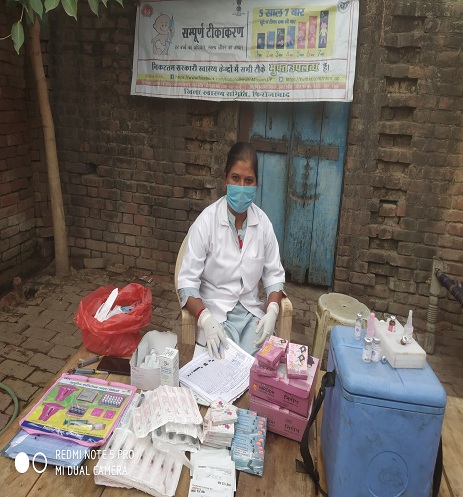
Employed as a staff nurse at the Sant Nagar urban primary health center (UPHC) in Firozabad, Manisha is tasked with supporting all government health programs being implemented by the UPHC. She, however, considers her role in facilitating access to FP services one of her more significant responsibilities.
I was trained by The Challenge Initiative (TCI) project on family planning (FP) counselling, Antara as well as intrauterine contraceptive devices (IUCDs). I am committed to my FP-related work since my UPHC is visited by a large number of women who depend on me for their FP needs. I cannot afford to miss even a day of work and try hard to be there for everyone.
Manisha, Staff Nurse,
Sant Nagar, (UPHC) Firozabad, Uttar Pradesh
The COVID-19 lockdowns and the resultant closure of the UPHC was a situation she no one had every anticipated – or something her training had ever prepared her for.
“I quickly realised how difficult it was going to be for me and my clients when it came to service delivery. So, when my mother was hospitalized for cancer, it was a very difficult moment for me, torn as I was between my love for my mother and the need to be with her at her bedside, and my commitment to my clients to make sure they were not left unattended either. I then decided that I would carry my family planning client register with me when I was in the hospital with me mother at the cancer hospital,” says she.
True to her form, Manisha worked on her client every day she was by her mother’s bedside, reminding her Antara clients of their next dose falling due, ceaselessly working her mobile phone throughout the day to counsel family planning clients who had visited her at the UPHC earlier.
“I am happy that in my absence none of my family planning clients had to return without availing the services they sought from me,” says Manisha with a smile.
quality outcomes, Manisha also shares her experience with male engagement
in strengthening FP service delivery to demonstrate her commitment
to supporting communities in uptake of family planning services.
“I remember when a frail woman – and a mother of seven - visited our UPHC to for STI (sexually transmitted disease) treatment. She was in poor health, and I tried counselling her on various options available for family planning so she could focus on the well-being of her children as well as her own health. She was amenable to the idea herself, but was obviously reluctant because she knew her husband staunchly refused to adopt any FP method, either for himself or for her,” says Manisha.
Manisha decided to continue the dialogue with her client whenever she came to the UPHC for follow-up visits.
One day, seeing her accompanied by her husband, Manisha plucked up the courage to speak to him directly, despite the woman’s discomfort at the idea. Manisha was determined, though, and she took the couple aside and gently told him about his wife’s poor health and how it affected the well-being of the whole family, including their seven children at home. “I explained the benefits of family planning in detail to both of them, especially the husband,” says Manisha.
It was not easy, but after a number of counselling sessions, Manisha was able to persuade him to consent to his wife and himself adopt family planning. “It was then that I felt a sense of satisfaction. I had learnt first-hand how reluctance of husbands and in-laws was arguably the biggest obstacle to women adopting family planning to limit the size of their families,” she says.
Woman Who Oversees Ward in India Champions the Cause of Family Planning
Contributors: KomalGhai and Parul Saxena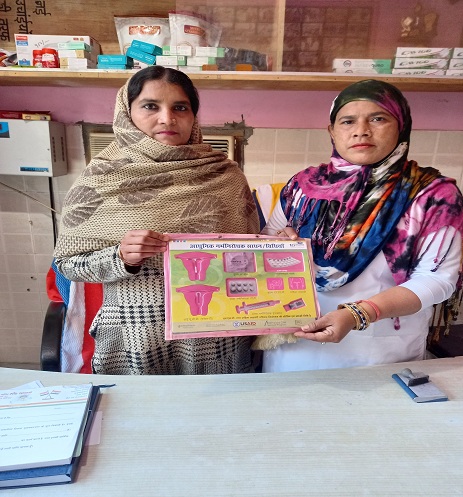
For the last three years, 34-year-old Mohsina has overseen ward number 45 as a ward “corporator” in Muzaffarnagar, a city located in Uttar Pradesh, India. In this role, she ensures that the health, education, housing, transportation and other needs of the ward’s urban population are adequately addressed. Although she holds a position of power politically, she was hesitant and a bit uncomfortable to speak up about women’s reproductive health issues. Until she met an Accredited Social Health Activist (ASHA) named Haajra.
Mohsina was just 19 when she married Mohammad Yakub, who is now a primary school principal in Muzaffarnagar. She has five children and was interested in adopting a family planning method since her last two pregnancies were unplanned but she feared possible side effects from family planning methods.
She attended many community meetings in her ward where she heard firsthand about women’s health concerns for themselves and their families. She would encourage women to get their children immunized and counsel them on nutrition, but she was unable to speak to them about family planning. Her encounter with Haajra changed all that.
Mohsina fondly recalls that meeting and what took place afterwards with pride: “In a community meeting, I heard an ASHA educating and counseling women on reproductive health issues. That day, I felt an overpowering urgency to do something about my fears and I called that ASHA to meet me after the event was over. I inquired about all the family planning methods and shared my concerns hesitantly. Haajra [the ASHA] explained in detail how each method works and told me something that changed my perception of contraceptives that ‘side effects are temporary and not life-threatening.’ She gave me the number of the nearest urban primary health center (UPHC) where during fixed day static services (FDS) day, assured and quality FP services were provided. I was impressed with her and learnt that she had received hands-on coaching under the PSI-TCIHC project. I decided to adopt a long-acting reversible family planning method and availed services during an Antral diwas/FDS day organized at the UPHC. I did not have any serious side effect.
After overcoming my fear, I realized there are many women in my ward who are ignorant or have myths and misconceptions associated with contraceptives. I decided to empower women with correct information. With ASHA Haajra I organized group meetings exclusively on family planning in various locations in the ward. I encouraged women to attend group meetings and openly discuss their problems with the ASHA. We also involved MahilaArogyaSamiti members in organizing the meetings to ensure women’s turnout. During these sessions, we talked at length about why family planning is critically important for the health of the child and mother and emphasized limiting the family size and maintaining a gap of at least three years between births. We advised choosing a method of their choice and availing services from the nearest UPHC as there was no longer the need to visit the faraway district women’s hospital.
community, I quote my example. I have accompanied many women
to UPHCs on Antral diwas, even helped women who are willing
to adopt a method by convincing their in-laws/husband.”
It is critical that women not only have access to credible information and good counseling on family planning, but also role models and champions, like Mohsina and ASHA Haajra, in their communities that can help create an enabling environment for the uptake of family planning services.
A Half-Constructed House But A Fully Functional Toilet: The Story of Toilet Champion of Chinnakampalli
Contributors: Dinesh Kumar Pandey, Deepti Mathur and Sanjay Singh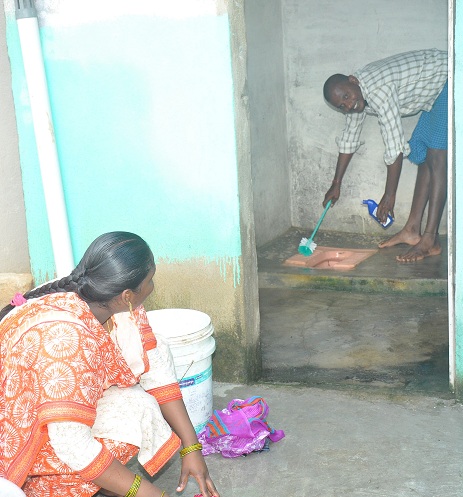
A tailor by profession, Lakshmipathi lives in Scheduled Caste (SC) colony in Chinnakampalli village in Chittoor district in the south Indian state of Andhra Pradesh.
Lakshmipathi lives with his family in a partially constructed house – but one that has a fully-functional toilet! This has made him a household name in the community – not only for his commitment to safe and dignified sanitation in his house, but also for working hard, day in and day out, to educate his children till graduation - and even beyond.
What is even more astonishing about Lakshmipathi is he constructed the household toilet by taking a loan from a private lender on interest, something which is unheard of in this small habitation where most households did not have a toilet as recently as April 18, 2022, when the Swachh Bharat Mission (SBM) implemented the toilet construction programme with the help of the panchayat and local administration.
Strangely, as this was happening, Lakshmipathi realized for reasons unknown to him, his name was missing from the list of beneficiaries for toilet construction, and despite his best efforts, he was ignored during the process of construction of toilets. He confesses initially, he had never thought of constructing a household toilet since he was barely able to meet his children’s college fees, even though, ironically, his own grown-up daughter had asked him many a time to construct a household toilet seeing how difficult it was for her to walk long distances in search of privacy every time she had to relieve herself in the fields. He says the constant hand-to-mouth existence made it very difficult for him to heed her request, though he was fully aware of her predicament.
It was only when PSI India Sanitation Counselors met Lakshmipathi and his friends during a group session in the village that Lakshmipathi first realized how vital it was to have a safe and hygienic household toilet in his house. He says the PSI India Sanitation Counselor showed him videos on toilet construction and use, and he was struck by the message in the video – that if a father uses a toilet, then the children will also learn from him and follow his example, and a responsible father will always use a toilet.
Moved by the example in the video, Lakshmipathi realized while he was doing his best to be a responsible to his children, his had however failed them in one aspect – by not constructing a toilet at home. But to his credit, Lakshmipathi was torn between his modest means and the large number of priorities vying for his little savings, most importantly his incomplete house.
But he did understand the importance of having a toilet in the house for the family and the importance of setting a good example to his children by being a responsible father. He thus decided to give priority to toilet construction rather than wait to complete his house. Because of lack of funds, he decided to take a loan from a private lender in the village to construct the toilet as a priority.
He beams with satisfaction when people tell him not only is his family regularly using the toilet since the day it was constructed, but his example has made him immensely popular in the village. People tell him others in the village speak highly about his progressive attitude and want to emulate his example by making toilets at home also.
Lakshmipathi modestly credits his popularity to the effort of the PSI India Sanitation Counselors who gave him insights and knowledge about the significance of sanitation for every household and every person. He doesn’t stop here: he says the PSI India Sanitation Counselors taught him how to maintain and keep the toilet clean through the video. He says he is especially proud of the fact his “children use the toilet at home with dignity and do not waste time in open defecation; instead they now use their time productively in studies”.
Today, not only he, but even his family members help keep the toilet clean.
PSI India Sanitation Counselors today reach out to every household in our project villages to motivate them to not only construct household toilet but also to use them regularly.
In the three years of Project SAVERA in Chittoor district, PSI India endeavours to change the behavior of 2,00,000 households towards sanitation in 400 project villages in the district.
Paving the Way to Better Health In Her Community
Contributors: Parul Saxena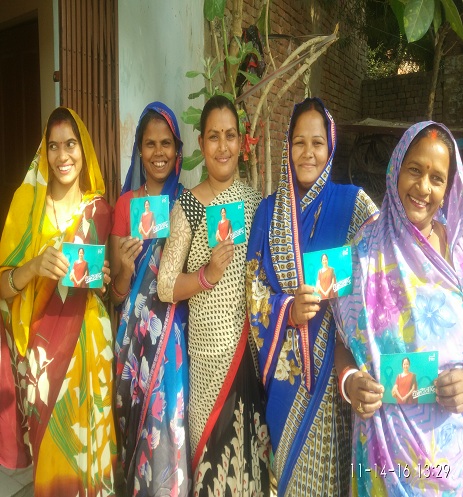
Pinki, 35, a resident of the Bastauli slum in the Indira Nagar of Lucknow, Uttar Pradesh. Pinki, a homemaker, works part-time at stitching and sewing to supplement her income for the schooling of her three daughters. Her first encounter with cervical cancer occurred two years ago when her beloved older sister passed away from the disease. Her uncontrollable sobs show the suffering her family went through. A year after this unfortunate incident, Pinki met a member of the PSI India outreach team while participating in a door-to-door outreach campaign for cervical cancer awareness.
Pinki herself got screened for cervical cancer at a camp organized by PSI India, and she was tested positive. She was treated with cryotherapy at a nearby PSI India network private facility for a very small fee. She had the full support of her three daughters and husband Rajendera since they did not want to lose another family member.
As a result of the services, she got inspired and motivated to mobilize other women, her family, and friends for screening during her free time. She frequently participates in community meetings organized PSI India, helps outreach workers by sharing her own example with community women to dispels screening myths, and helps fellow women move from ignorance to awareness. She has carved out her own life and is now paving the way for their better health.
to organize many outreach camps for women and personally
mobilized around 200 above women for pre cancer
screening," she says.
As a responsible mother, she has also committed to bringing her three teenage girls to the District Women Hospital in Lucknow for the free HPV vaccination.She says, "Once my daughter receives the HPV vaccine, I will be better able to counsel mothers of other girls in my community and would handle any types of preconceived notions about cervical cancer prevention vaccination”. She believes that she has found her life's purpose and that by working on the cause of cervical cancer prevention she is trulyhonoring her late sister.
In Search of Dignity
Contributors: Deepti Mathur and Sanjay Singh
Kavita Devi, 42, is a TB survivor who recently suffered the tragic loss of her husband, Kapil. Despite the hardships, Kavita acknowledges, "It’s difficult to make ends meet, but somehow, I manage.” However, she now faces an even greater concern, which she openly shares.
The lack of a toilet in our home has become my top priority. Our dignity is at stake; every time my daughter has to go to the fields to relieve herself, I can't rest until she's safely back. During the monsoons, it's even more challenging—with the swarms of mosquitoes and the constant fear of snake bites, it's dangerous to venture outside.
Kavita Devi
Uttar Pardesh
She admits finding a private spot to defecate was getting increasingly difficult and risky. "Every time we saw people; we would shrink away in shame. Sometimes, people just stared at us, forcing us to quickly move away and look for a more secluded place," says she.
across rural India: a recent joint monitoring programme (JMP) on
water, sanitation and hygiene by the World Health Organization and
UNICEF released July 1, 2021 stated at least 15 per cent of the
population in India defecates in the open.
Initially, when Kavita’s husband was alive, her neighbours shared their toilet with the family, but soon after his passing, they grew reluctant. Kavita’s meagre earnings from selling beedi’s were too little to support even the family’s basic needs, let alone constructing a toilet.
One day, Kavita happened to attend a community meeting organized by PSI India’s Saadhan Sanitary Mart (SSM), where she was intrigued to learn how quality toilets could be built at affordable prices. With the help of a family friend, Kavita submitted an application for a loan; her application was forwarded to the SaadhanSuvidha microfinance agency and very soon, the loan was sanctioned.
To her surprise, SaadhanSuvidha also sent their technical expert to her house to supervise the construction of the toilet.
Kavita is delighted with her new toilet. "I am happy, but my daughter is the happiest," says a beaming Kavita
Non-Clinical Staff Play Role in Making UPHCs Adolescent-Friendly
Contributors: NiveditaShahi and Parul Saxena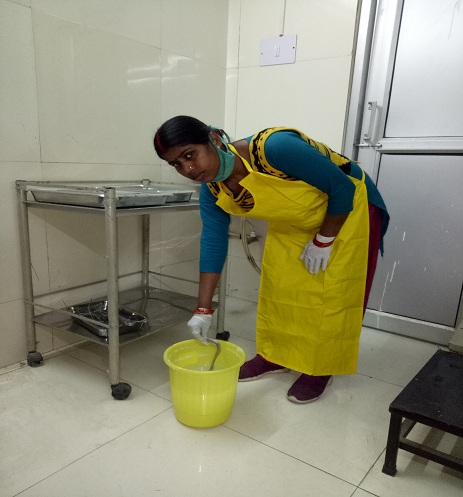
Pooja Kumari works as a janitor at the Aurangabad urban primary health center (UPHC) in Lucknow, Uttar Pradesh. Recently, she participated in a whole-site orientation (WSO), a TCIHC proven approach that targets all staff working in a health facility to become advocates for family planning.
All staff receive an “orientation” to gain a basic understanding of family planning and its benefits. At Pooja’s facility, the Medical Officer In-Charge conducted WSO for the entire staff on how to provide adolescent-friendly health services. Pooja was overjoyed to be sitting in the same hall as everyone else working for the facility.
With a sparkle in her eyes, she shared: “Since 2015, I am working in Aurangabad UPHC. As a janitor, my role is limited to facility housekeeping duties and responsibilities. When I was invited for WSO, I was somewhat astonished. I thought trainings are meant for medical staff only. At the same time, I was excited to have been counted for this training opportunity. It was a new experience for me. Whole-site orientation helped me to reflect on my adolescence, as back in those days there were hardly any services available for adolescents. In my teens, I could only approach my mother to discuss about menstruation and I don’t remember visiting any facility or hospital without any guardian.
“Kuchh to log kahenge” (People will say something)
[shared during the WSO session]."
"This story describes how unmarried adolescents face socio-cultural prejudices and stigma when they visit a facility alone. Their fear of being judged inhibits them to seek sexual and reproductive health care information or services. Due to insufficient and inaccurate information, they are left with much curiosity and unresolved issues. The participatory discussion followed by the story helped me to realize the health needs of adolescents and also equipped me with a know-how of how a non-clinical staff [like myself] can also create a conducive environment for adolescents by being non-judgmental and unbiased, regardless of their age and marital status.” I have learned so much from this orientation, both professionally and personally. Today, as a facility staff and as a mother I believe that the environment of a health facility and home should be adolescent-friendly so that they can fearlessly share their problems and get correct information related to sexual and reproductive health issues. In fact, after attending WSO, I have noticed a change in myself as immediately a few days later when some adolescents had visited the facility, I greeted them with a smile. I had never done this before. I am glad that I was considered as an important facility staff who can play a substantial role in creating enabling environment for adolescents.”
Washing Away Worry About COVID-19
Contributors: Deepti Mathur and Hitesh Sahni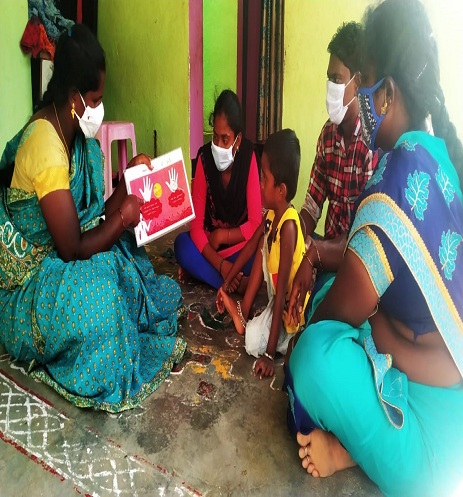
K. Mamtha, an Anganwadi worker in KodandaRamapuram village, Karvetinagaram, in Chittoor district of the south Indian state of Andhra Pradesh, says she is proud to have attended the training on handwashing organized by PSI in GramaSachivalayam, which was also attended by other government functionaries in the village.
Handwashing training was incredibly helpful for me, especially since it was the first time I truly realized the importance of handwashing to protect against COVID-19—not just for myself, but for my entire family. I even used the videos and flashcards provided by the PSI India volunteers to teach my children the correct way to wash their hands with soap every time they returned home from outside.
K. Mamtha
Kodanda Ramapuram, Andhra Pradesh
This has led to unprecedented behavioural change in Mamtha’s village - children now wash their hands before eating; not only washing hands with water, the children having learnt the value of washing hands with soap, now regularly wash their hands with soap as a habit, more so because they now understand that washing hands can protect them from COVID-19 also.
on her own expense and shared it with most of the children in the
village, who in turn learnt the handwashing steps from these
flashcards and even developed a game around it.
Mamtha is now using the videos and flash cards to share with other families in her community as well. She has also insisted on installation of a digital wall-painting on handwashing in her anganwadicenter, and says her effort to improve handwashing behavior during COVID-19 is being appreciated by her superiors in the mandal (district). Key opinion leaders in the village – including the Panchayat Secretary – have expressed their happiness about improvement in handwashing practices in the village, especially amongst children. Encouraged by the response, Mamtha says with the easy availability of vaccines in her village now, she is now motivating her community to come forward to get themselves vaccinated.
ASHA Helps Woman Move Beyond Just Surviving to Live Life to the Fullest
Contributors: IndraBhushan Srivastava and Parul Saxena
Accredited Social Health Activists (ASHAs) are empowering women like Rani Burman living in Jabalpur, Madhya Pradesh, India, to seek a better tomorrow. The Challenge Initiative for Healthy Cities (TCIHC) supports local governments in Indian states like Madhya Pradesh to strengthen the capacity of urban ASHAs to provide quality family planning counseling and referrals to meet the needs of women like Rani.
I was soaring on my new scooty, watching my dreams become reality. Life felt like a blissful dream, all thanks to Pooja (ASHA) Didi. Her guidance in family planning and career choices made it possible. I’m resolute that my daughter will have a brighter future.
Rani Burman
Madhya Pradesh
Rani continues- I clearly remember the day when Pooja Didi first visited me. I was eating only rice. She had asked, ‘Why are you eating only rice? You have small children; you must eat a healthy and balanced diet.’ My eyes had welled up and she sat there quietly. Once I felt better, I shared that ever since the birth of my second daughter financial hardships increased for us. My husband and in-laws wanted a male child so my husband did not spare money for us; instead, he spends most of his earnings on alcohol. Today I at least had rice to eat. Pooja Didi comforted me and left with a promise to return. From that day, she would visit me often, sometimes to give iron-folic tablets or to immunize my children or to just inquire about my health. One day, she cited her example and encouraged me to work and earn for the family. I told her that I had completed my secondary education but my husband does not like the idea of my working outside of the house. Didi jolted me to think of making a change in the drudgery of my life. One afternoon, when Didi came, my husband was home.
She checked about children’s health and started a conversation around the importance of family planning and also prodded upon the idea of my working outside of the house. She reasoned without fear that these two decisions will only make life better for us. My husband was moved. A few days later, I asked my husband if I could look for a job. To my surprise, he gave his nod. I soon found one and gradually found a better one as a receptionist at a hospital. Pooja Didi was elated!”
Financial independence boosted my confidence. I started expressing myself. I told my husband that I know that the family desires to have a male heir but given that we already have two daughters and our income is also not sufficient to support this current family of six members including his parents. Thus, we must do something about family planning as we cannot bear the cost of upbringing one more child. My husband approved and asked me to inquire all about family planning from ASHA Didi. Next time, when Pooja Didi visited us, she explained all the family planning choices and clarified our doubts. We decided to adopt a permanent family planning method as we wanted to be free.”
These two decisions have changed my life. Not only am I free from the constant pressure of producing a male child but I have become independent too and also gained respect from my family and society. I am determined that my daughter will do advanced studies and become a doctor or a police officer. I have learnt not to fear life but to live life.”

